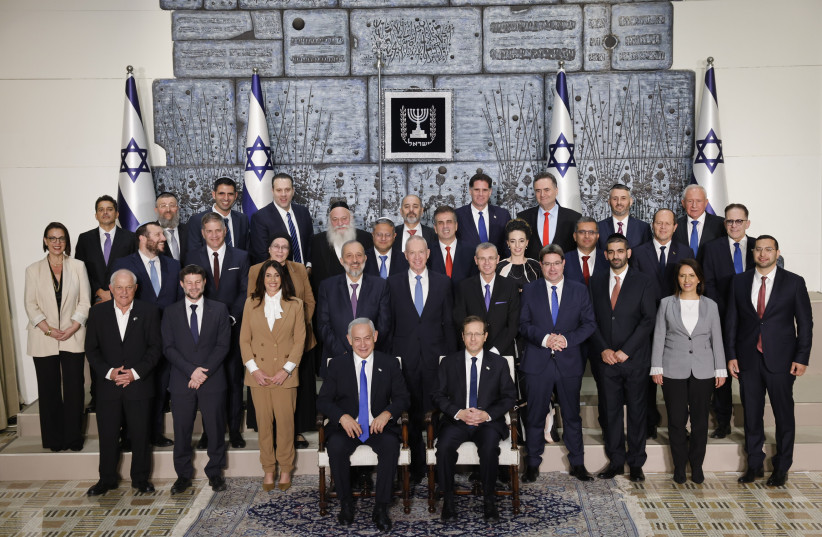What are the challenges facing Israel's new government? - opinion

The government will have to deal not only with correcting past defects but mainly with pressing political-security related issues and economic-social matters.
The first weeks of Israel’s Center-Right government started off energetically, attracting both popular support and, as was expected, controversy – now further complicated by the High Court’s decision to declare Shas leader Deri unfit to be a minister, creating a political and administrative disconnect the end of which is not yet in sight.
The first item on the government’s agenda was the proposals for a long-overdue overhaul of Israel’s justice system, which is now going through a thorough and extensive process of deliberation by the Knesset’s legal committee, hearing different views, both pro and con, before final legislation. At this point, it is unclear how much the actual law will conform with or differentiate from Justice Minister Levin’s original draft.
A deficit in democracy and administration from Israel's outgoing government
Israel’s outgoing government had left the country with a problematic democratic and administrative deficit, starting with the unfair and unequal distribution of Knesset committees, continuing with the decision to embark on a military operation without approval by the security cabinet, and concluding with an international agreement that relinquished part of Israel’s maritime sovereignty without the approval and even the knowledge of the Knesset.
As veteran left-wing journalist Nahum Barnea wrote: “The outgoing coalition debased basic laws and interfered with parliamentary procedures” – all the above in addition to ill-disguised and improper attempts to enact laws to prevent an elected prime minister from serving, laws which have no equal in any Western society.
Though calling them Bolsaromistas or Trumpists would be going too far, it seemed from the raucous and unparliamentarily behavior at the inauguration ceremony of the new government as if the former coalition was unwilling to accept the results of Israel’s democratic election, underscoring their own democratic deficit.
But looking at the new government, the forming of certain ministries and the splitting of some others for political and personal reasons will pose more than a few problems. Putting it together resembled solving a Rubik’s Cube, due to Israel’s stultifying electoral system that prevents forming a stable government based on the majority party and in the present case, exacerbated by the agendas and features of some of the coalition partners.
Still, the results, on the whole, justified the effort and most of the ministers, especially from Likud, are well-qualified to run their respective ministries, though this didn’t prevent the uproar about some of the more marginal appointments, like that of MK Avi Maoz for the position of deputy minister in the Prime Minister’s Office to be in charge of “external links” of the Education Ministry, an unwelcome inheritance from the days of Yuli Tamir of Labor as education minister (albeit for reasons opposite to those of Avi Maoz).
But in effect, most of these appointments will mainly mean a sign on his or her office door and not connote substance. The Book of Proverbs warns of the damage that even one fool could cause but fortunately the relevant political and religious powers that be quickly put an end to ideas and proposals that could have implied discrimination against certain segments of the population. Indeed, the government will be tested not only by its successes but also by its ability to curb extremism.
Bezalel Smotrich's problematic appointment
MORE PROBLEMATIC may be the appointment of Bezalel Smotrich as an additional minister in the Defense Ministry, plus the large payload he has on his economic agenda. This hybrid appointment requires a precise delineation of the scope of his functions, limiting them to current civilian issues concerning Israeli citizens living in Judea and Samaria but not extending to the affairs of the Arab population there or to matters of a political or military nature. These must remain the sole responsibility of the IDF and its Chief of Staff, and this was put to a test last week.
Addressing Israel's judicial system
As mentioned and as evidenced by the present fierce debate, one of the important tasks of the new government is to deal in an equitable and intelligent fashion with the shortcomings in Israel’s judicial system, which according to a Hebrew University study on the crisis of confidence in the Supreme Court and the legal system in general, endangers Israel character as a democratic state based on law.
The blurring created by the constitutional revolution of 1992 between the branches of government – the legislative, the executive and the judiciary – requires a thorough reconsideration devoid of ulterior motives. The public debate about this has indeed started and unfortunately, given vent to a surplus of demagogy over reason and responsibility on both sides. What’s more important, it is not congenial to the real issues at hand.
One extreme proposal that should be shelved is to emulate the politicized justice system in the US, which includes the election of judges to the Supreme Court based on political considerations. Though the current system in Israel is far from perfect, better ways should be sought to reform it.
Tackling economic matters
But looking at the challenges ahead, the government will have to deal not only with correcting past defects but mainly with pressing political-security related issues and economic-social matters, such as the cost of living and housing, the control of monopolies and the threat of a global economic crisis.
The liberal economic character of the new Center-Right government and the commitment of Prime Minister Benjamin Netanyahu and Finance Minister Bezalel Smotrich to a free economy will ensure not only the expansion of Israel’s economy with the world abroad but also encourage a flow of new investments.
Political-security issues for Israel
In the political-security field, Israel faces challenges but also opportunities, especially with the Arab world. The main security challenge is Iran and increasing Palestinian terrorism in the West Bank. On the other hand, it is also a chance to further deepen the close relations with our main ally, America, a task to which the recent visit by Jake Sullivan, the US National Security Advisor and the talks later this month with Secretary of State Blinken, will provide ample scope – with Iran being the main item.
Changes to Israel's foreign relations
In this connection, the recent statement of Netanyahu calling for close cooperation and coordination with the Biden administration was well-timed. These meetings are also an opportunity to pre-plan Netanyahu’s first visit in his new capacity to the White House. Meetings between Israeli prime ministers and American presidents always require thorough preparation so as to maximize the chances of their successful outcome – something which both leaders are interested in.
All the above promises a new impetus in Israel’s foreign relations, and the appointments of the experienced Ron Dermer as strategic affairs minister and Tzachi Hanegbi heading Israel’s National Security Council, as well as that of Foreign Minister Eli Cohen, were well considered.
The writer, a former MK, served as the ambassador to the US from 1990-1993 and 1998-2000.
Jerusalem Post Store
`; document.getElementById("linkPremium").innerHTML = cont; var divWithLink = document.getElementById("premium-link"); if (divWithLink !== null && divWithLink !== 'undefined') { divWithLink.style.border = "solid 1px #cb0f3e"; divWithLink.style.textAlign = "center"; divWithLink.style.marginBottom = "15px"; divWithLink.style.marginTop = "15px"; divWithLink.style.width = "100%"; divWithLink.style.backgroundColor = "#122952"; divWithLink.style.color = "#ffffff"; divWithLink.style.lineHeight = "1.5"; } } (function (v, i) { });

